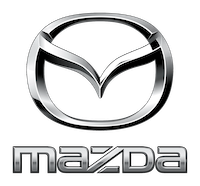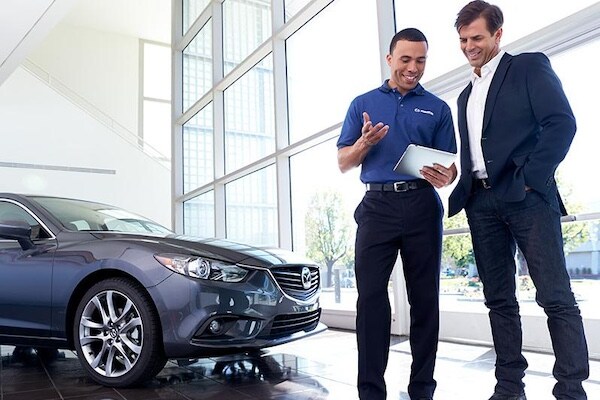

Vehicle Financing
Should I Buy Or Lease?
If you find yourself unsure about the best path for your needs, rest assured – our team is ready to provide expert guidance to help you make informed decisions!
The Difference Between Buying and Leasing
Choosing a Mazda is an easy decision, yet determining whether to lease or buy may present a more significant challenge. Delve into the advantages and disadvantages of both leasing and financing to make a thoroughly informed decision that aligns with your preferences and needs.
Get Pre-Approved
Consider LEASING if you:
- For individuals capable of estimating their annual mileage needs for the upcoming years, leasing emerges as a practical choice, especially with limited miles.
- If maintaining a pristine and well-maintained vehicle is a point of pride, leasing presents itself as an excellent option.
- Prioritizing staying current with the latest automotive innovations? Leasing provides the opportunity to enjoy a new car more frequently.
- If having a vehicle under warranty is crucial to you, explore the advantages that leasing can offer in this regard.
- For those who value the convenience of returning a vehicle at the end of the agreement, leasing stands out as an appealing choice.

Consider BUYING if you:
- For those who enjoy driving or have a lengthy commute, opting to purchase a vehicle is the ideal choice, providing unlimited mileage.
- Considering a substantial down payment? Choosing to buy a vehicle emerges as a financially savvy decision.
- Aspiring to customize your vehicle with aftermarket equipment? Purchasing allows for easy and personalized modifications.
- If your plan involves keeping your vehicle for an extended period, buying proves to be a wise long-term investment.
- Desiring complete ownership of your vehicle? Opt for buying, and once all payments are completed, the vehicle becomes entirely yours.
Advantages & Disadvantages
| Leasing | Financing | |
|---|---|---|
| Upfront Costs | Choosing to lease typically leads to lower initial costs. | Opting to buy involves higher initial costs, which may include a substantial down payment. |
| Monthly Payments | Leasing frequently involves lower monthly payments but accompanies higher finance charges when compared to a traditional vehicle loan. | Monthly payments for purchasing are generally higher than lease payments. |
| Maintenance | Leased vehicles often come with maintenance coverage that includes routine services such as oil changes and tire rotations. | Owners are responsible for all maintenance, and additional services may be available at an additional cost. |
| Wear and Tear | To prevent additional charges for excessive wear and tear, make sure to maintain the vehicle's condition as specified in your lease agreement. | Although wear and tear may not directly impact your loan, it could diminish the vehicle's resale value, potentially resulting in additional costs during a trade-in or sale. |
| Use/Mileage | Leases are subject to mileage limits, usually around 10,000 to 12,000 miles per year. Exceeding this limit incurs additional charges, typically ranging from 15 to 30 cents per mile. | Buying provides unlimited miles, but excessive mileage may impact the resale or trade-in value of the vehicle. |
| Customization | Modifying the vehicle's appearance may violate the lease agreement, resulting in additional charges. | Vehicle owners enjoy the freedom to customize their cars without restrictions. |
| Ownership | Leasing entails not owning the vehicle; instead, you make payments to use it during the lease period, with the option to purchase it at the end if desired. | Opting to buy means you own the vehicle, make monthly payments, and it becomes entirely yours once fully paid off. |
| End of Term | At the end of the lease, you have the choices to return, purchase, or trade the vehicle. | At the end of the loan term, you own the vehicle and have the options to keep, sell, or trade it. |
FAQS
Exploring the Distinctions Between Buying and Leasing a Car
Discover the advantages of owning a car outright when buying, compared to the flexibility of leasing for a set period, typically 2-3 years.
Evaluating Long-Term Cost Efficiency
Consider the cost-effectiveness of buying a car, building equity over time, versus leasing, which offers lower monthly payments but lacks ownership benefits.
Understanding Upfront Costs for Buying and Leasing
Explore the financial aspects of buying with potential larger down payments and taxes versus leasing, which typically involves lower initial costs such as a down payment, first month's payment, and a security deposit.
Navigating Mileage Restrictions in Leasing
Understand the implications of mileage limits in leasing agreements, with additional fees for exceeding them, compared to the unlimited mileage option when buying a car.
Customization of Leased Vehicles and Ownership Considerations
Learn about the restrictions on modifying leased vehicles and the freedom to customize when owning a car outright.
Options at the Conclusion of a Lease Term
Explore your choices at the end of a lease term, including buying the car, returning it, or potentially entering into a new lease agreement.
Selling a Leased Car Before the Lease Term Ends
Discover the process of selling a leased car before the term ends, with the requirement to pay off the remaining balance on the lease.
Maintenance Responsibilities for Leased Cars
Understand your responsibilities for regular maintenance and servicing of a leased vehicle, similar to the obligations when owning it.
Negotiating the Purchase Price of a Leased Vehicle
Consider the potential opportunity to negotiate the purchase price of a leased vehicle at the end of the lease term.
Insurance Requirements for Buying vs. Leasing
Explore the insurance requirements for both buying and leasing, with distinct considerations for insurance coverage when leasing.